
Learning by Doing
Thursday, April 1, 2010
BY JENNY SHERMAN
Experiential learning opportunities give Carlson School students a huge advantage in the classroom—and beyond
The last few years have seen a surge of experiential learning programs in education. While the traditional lecture-based and case-study approaches haven’t gone away, they’re being augmented by opportunities and programs that focus on learning through doing. One big reason why: Experiential learning encourages students to apply theory beyond the classroom. The core idea is that students engage more readily with knowledge if they can live it.
This is true for business schools which are answering the call to provide students such immersion experiences. And it’s especially true for the Carlson School. Starting with its class that entered last fall, the Full-Time MBA program requires all students to participate in an experiential learning component. “This is a very high-fidelity, experiential opportunity for students,” says Ed Joyce, professor of accounting and associate dean for the school’s MBA programs. “The ability to take material that you learned in the classroom and apply it to tactical situations is not a trivial undertaking.”
The Carlson School has numerous ways for students to participate in experiential learning. There is, for example, the two-semester Entrepreneurship in Action (EIA) course in which undergraduates plan, launch, and operate a real business using up to $15,000 in seed money and dedicated on-site facilities at the Carlson School (such as the Business Hatchery). Or they can sign up for the Deluxe E-ternship Program to work with early-stage companies as they build their business.
For Full-Time MBA students, four Enterprise programs are offered: Brand, Consulting, Ventures, and Funds. In these programs, actual client businesses engage student-managed teams to develop solutions for actual business situations. They must hit real deadlines, real financial goals, and real performance targets.
Another example: The Carlson School partners with institutions abroad to provide the China Executive MBA(CHEMBA—Guangzhou, China); the Warsaw Executive MBA (WEMBA—Warsaw); and the Vienna Executive MBA(VEMBA—Vienna) program. The novel Virtual Team Project (VTP) experience assembles teams of students from all these disparate sites, and students in the Carlson School Executive MBA program (CEMBA), to create business plans for developing a product in a global market. The teams meet and plan online during the program, then gather in Minnesota each spring to present their projects.
“One reason why we get glowing testimonials from graduates who’ve gone through the experience is because it gives them a head start,” says Joyce. “They get more comfortable on a job faster than their colleagues from competing schools simply because they’ve been through it.”
With that in mind, we checked in with five Carlson School graduates to get their take on how experiential learning made an impact on them.
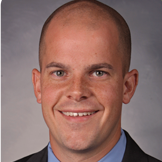
As far as my individual takeaways from the Brand Enterprise, I grew the most in my ability to tackle large, ambiguous issues; quickly synthesize large amounts of data; and ultimately build a compelling story to influence key business decisions. I also learned a lot about team dynamics and how to achieve results with people.
Ryan Backer
“I can say that the school’s focus on leadership, research, and experiential learning via the Enterprise programs were big differentiators that aligned perfectly with my interests and needs,” says Ryan Backer, ’09 MBA,when asked for a reason why he chose the Carlson School for his full-time degree program. “The Carlson School’s close relationship with so many of the world’s strongest companies resonated with me as well.”
Backer also had a personal reason to attend the school. “I was born and raised in Minnesota and was itching to get back after spending eight years in Indianapolis with Eli Lilly,” he says. “So when my wife had a job offer ‘back home,’ we jumped at the opportunity and I quickly applied to the Full-Time MBA program.”
Since Backer’s emphasis was in marketing and strategy, the type of work that the Brand Enterprise consultants engage in was right on par with what he was hoping to do career-wise. “Plus the projects and companies were always impressive and unique,” he says. “As a career-switcher, it was really important to me to get that hands-on, relevant experience.”
Backer worked on three projects in his year and a half with the Brand Enterprise. “For my first, we developed a marketing plan to combat increasing competition in the GPS market for a Fortune 500 consumer electronics company,” he says. “In my second, our team created a loyalty building program for a commodity product line for a Fortune 100 energy and agriculture co-op.” His final project was a brand audit and a rebranding strategy for the University of Minnesota’s Institute of Technology.
Backer’s involvement with the Brand Enterprise has given him a tremendous knowledge base to draw upon in his current position at General Mills in its Applied Shopper Insights function. “It’s marketing research, with a sales/retail focus,” he says. “As far as my individual takeaways from the Brand Enterprise, I grew the most in my ability to tackle large, ambiguous issues; quickly synthesize large amounts of data; and ultimately build a compelling story to influence key business decisions. I also learned a lot about team dynamics and how to achieve results with people.”
Backer wholeheartedly recommends the Enterprise programs. “Dig in, get your hands dirty, and take full advantage of the unique opportunity to gain experience—and exposure—tackling legitimate business issues within a number of world-class organizations,” he says. “Oh, and prepare to work! It’s a significant time commitment, but the experience truly pays large dividends.”
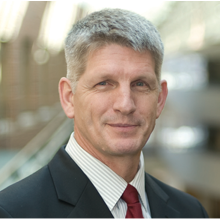
The knowledge gained from having international team members became a very important factor in my take-away from the project.
Paul Figlmiller
Having been involved with the travel industry for most of his career, Paul Figlmiller, ’08 MBA, was an important contributor to his Virtual Team Project (VTP). The team—which included students from China and Europe—created a strategic business plan to develop a niche-focused cruise-marketing company. “I had worked on international cruise projects in Europe and Asia, but had not worked specifically to assess Asian or European cruise markets—except for Britain,” he says. “The knowledge gained from having international team members became a very important factor in my take-away from the project.”
Figlmiller’s VTP experience is still paying off—he’s preparing a new business plan based on some of the materials his international team assembled.
Although he says VTP was “an immensely rewarding project,” he is quick to point out that other aspects of his graduate studies were similarly rich in experiential learning. “Actually, that is one of the greatest things about the Carlson School program—every course and even every class session brought the business experiences and real situations of the students into the learning process,” he says.
Group study projects, he notes, were immensely helpful in giving students real-world scenarios from which they could glean insight. Some projects encouraged students to bring marketing plans, statistical data, or even strategic concepts from their workplaces into discussion sessions to be scrutinized. “That fundamentally made the learning process an experiential one—and much more valuable for me.
“I am a strong advocate of experiential programs that give anyone wanting to learn a means to make their studies more relevant to them,” he adds. “They help make the course material more meaningful.”
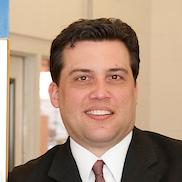
There were cultural issues along the way, but you figured out how to make things work. It forced [people from] multiple cultures to work together.
Jeremy Lenz
When your mentor and manager suggest you consider going back to school to earn an MBA, you go. Such was the case with Jeremy Lenz, ’09 MBA. In partnership with his mentor, Vince Ruane, a former 3M executive, he had written a business plan for a public-private biotech-industry collaboration in the city of St. Paul. With that experience under his belt, it was a natural fit for Lenz to join the newly formed BioBusiness Alliance of Minnesota in January 2005. He helped develop the organization, eventually becoming vice president of operations (and earning a 2008 Minneapolis/St. Paul Business Journal “40 Under 40” award in the process). Dale Wahlstrom, a former Medtronic executive, recruited Lenz to the position before becoming the statewide organization’s CEO. Both Ruane and Wahlstrom encouraged Lenz to head back to school.
He took the hint, enrolling in the Carlson School’s Part-Time MBA program in 2007. He soon transitioned into the Executive MBA program to speed up his degree acquisition, as well as to work with the more seasoned managers also enrolled in the program.
Another bonus to the move: signing on for the program’s VTP. Lenz was assigned to a team with students from Warsaw, Vienna, and China. Their project: develop a market plan for an Austrian firm, SkiData, that manufactures pass cards embedded with microchips. The cards allow pedestrians, skiers, and event attendees to access different sites; the technology has even found use in parking garages. The new plan was looking to capture the growing downhill skiing market in China.
The team members used Skype software for conference calls (“It was interesting trying to find a time when team members from Poland, China, Austria, and Minnesota were all awake at the same time,” says Lenz, who finally met his teammates on a Carlson School trip to China.) The entire team gathered in Minnesota at the end of the 2009 spring semester to present their project and walk for graduation.
Lenz describes the project as a great experience. “There were cultural issues along the way, but you figured out how to make things work. It forced [people from] multiple cultures to work together,” he says. “The most important thing is that it broke down mental barriers—the kind that you face when you say to yourself, ‘Oh my goodness, this is going to be hard to do.’”
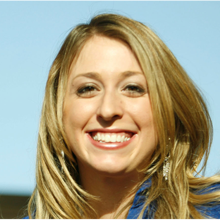
The skills and framework I developed through EIA—ideation, market intelligence, conceptual design, and go-to-market—directly translate to the work I'm doing today.
Kari Severson
“During my first week at the University of Minnesota, I attended an Entrepreneurship Club meeting featuring David Wagner, founder of the Juut Salon spa chain,” says Kari Severson, ’08 BSB. “I was incredibly inspired by his spirit and story, and instantly hooked on the start-up concept.”
The encounter also drove her to seek out entrepreneurship options in her course load. She found two: Entrepreneurship in Action (EIA) and the Entrepreneurial Internship program. Severson’s EIA team developed a business plan to create customized leather hockey gloves, for sale online through a website the group designed. As an entrepreneurial intern, she also helped launch the Survivors’ Studio, a nonprofit fitness center for women cancer survivors.
“EIA was the perfect opportunity—a chance to learn important principles and actually give them a shot in a safe environment,” she says. While the standard finance, accounting, and marketing classes each focused on specific topics, the EIA program integrated key themes from across the business spectrum into one rich learning experience. “[It] allowed me to take best practices and learning from my studies and apply them to a single start-up concept. It was a holistic experience that brought my other academic-focused classes to life.”
Today, Severson is a product consultant at OptumHealth, a division of UnitedHealth Group that develops wellness concepts to encourage consumers to live a healthier lifestyle. She’s currently working to develop products for the workplace. “The product development process closely mirrors the business start-up process we experienced in EIA,” she says. “The skills and framework I developed through EIA—ideation, market intelligence, conceptual design, and go-to-market—directly translate to the work I’m doing today.”
Severson strongly recommends experiential programs for other business degree candidates. “There is no substitute for the real-time learning and real-life experiences,” she says.
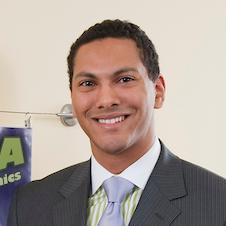
If you're ready to realistically apply your education and you're not paralyzed by the fear of failure, courses like Entrepreneurship in Action are for you.
Engeda Selemon Asfaw
Entrepreneurship drew Engeda Selemon Asfaw to the Carlson School as an undergraduate, and it’s what kept him there. He not only participated in the EIA course, graduating in May 2009 with a BSB in entrepreneurship, he passed up a position as an IT consultant in Chicago to accept a job as administrator for the brand-new Youth Entrepreneurship and Leadership Programs (YEP), offered by the University of Minnesota’s Office for Business and Community Economic Development. “We’ve built a social entrepreneurship within the University system that’s responsible for training almost 100 students from inner-city Minneapolis and St. Paul,” says Asfaw.
Participating in the EIA program was essential to solidifying Asfaw’s interest in entrepreneurial endeavors. His group launched Aozora Organics, the Carlson School’s first green tech business, for which he served as the CEO and CFO. Aozora’s line of high-end organic cosmetic products is developed entirely from renewable resources. “Everything from the ink on the bottle labels to the filler inside was made from a sustainable input,” he says. “What better opportunity to test my accumulated knowledge than to build a business from the ground up? This was the most important and most relevant educational experience of my life.”
Though it doesn’t seem a natural step from luxury organic skincare to youth leadership, Asfaw saw how he could apply the skill set gained through EIA to his new role with the YEP initiative. He now recognizes the value in having flexed his entrepreneurial muscles while still in school. “EIA gave me the confidence, experience, and fortitude to approach my future in a much more dynamic and action-oriented fashion,” he says.
It’s no surprise, then, that he urges other like-minded students to consider similar experiential learning programs. “If you’re ready to realistically apply your education and you’re not paralyzed by the fear of failure, courses like Entrepreneurship In Action are for you,” he says. “But be forewarned, this is not a simulation. You’re dealing with real money, real people, and real business—it’s the real deal.”